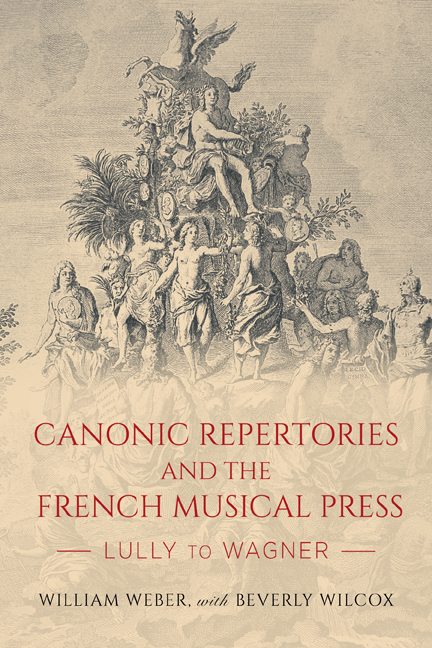Book contents
- Frontmatter
- Contents
- Acknowledgments
- List of Illustrations
- Introduction
- 1 The Domestic versus the Foreign in Eighteenth-Century Paris and London
- 2 Elements of Canon Formation at the Concert Spirituel (Beverly Wilcox)
- 3 To Praise or to Criticize? The Evolution of Music Criticism in Eighteenth-Century France
- 4 Haydn in the Press during the 1780s: How Did a Canon Arise?
- 5 Parallel Canons at the Opéra and the Comédie-Française at the End of the Ancien Régime
- 6 Negotiating Canonic Repertory and les progrès de la musique at the Paris Opéra, 1815–1830
- 7 The Evolution of le vieux répertoire at the Opéra-Comique in the Nineteenth Century
- 8 Richard Wagner, Concert Life, and Musical Canon in Paris, 1860–1914
- An Afterword
- Bibliography
- Index
6 - Negotiating Canonic Repertory and les progrès de la musique at the Paris Opéra, 1815–1830
Published online by Cambridge University Press: 26 May 2022
- Frontmatter
- Contents
- Acknowledgments
- List of Illustrations
- Introduction
- 1 The Domestic versus the Foreign in Eighteenth-Century Paris and London
- 2 Elements of Canon Formation at the Concert Spirituel (Beverly Wilcox)
- 3 To Praise or to Criticize? The Evolution of Music Criticism in Eighteenth-Century France
- 4 Haydn in the Press during the 1780s: How Did a Canon Arise?
- 5 Parallel Canons at the Opéra and the Comédie-Française at the End of the Ancien Régime
- 6 Negotiating Canonic Repertory and les progrès de la musique at the Paris Opéra, 1815–1830
- 7 The Evolution of le vieux répertoire at the Opéra-Comique in the Nineteenth Century
- 8 Richard Wagner, Concert Life, and Musical Canon in Paris, 1860–1914
- An Afterword
- Bibliography
- Index
Summary
The musical canon forged in the 1770s and 1780s experienced a long, serious crisis after the return of the Bourbon monarchy in 1814–15. This chapter examines the period of problematic management at the Opéra that in effect kept the old operas at the center of the repertory until the late 1820s. The frequent performance of operas some fifty years old stimulated a harsh debate as to whether new operas should supplant the old ones. Factions arose calling either for Rossini to be made head of the Opéra or for the old canon to be kept at the center of the repertory. It is not surprising that, because the political community was facing major difficulties in reconstructing the Bourbon monarchy, the management of the Opéra was more or less left up to the the leadership of its own Committee of Administration, which spent a decade struggling to reconstitute the repertory. In the process newspapers that opposed the government attacked Rossini, thereby bringing national politics into the debate. But the arrival of strong leadership at the Opéra at the end of the decade brought about a complete transformation of the repertory.
The new operas brought to the Opéra in the 1770s managed to survive the deep changes which occurred in French politics between 1789 and the return of the Bourbon monarchy in 1814–15. Although the Concert Spirituel came to an end and the Comédie-Française lost its monopoly, the Opéra survived the politically unstable years between 1789 and 1815 relatively smoothly. As Mark Darlow has shown, the directors of the Opéra knew how to stay out of trouble politically, deferring to revolutionary ideology just enough to be able to continue the regular repertory on a long-term basis. In 1795 the musicians and administrators who had taken leadership in musical life in the 1790s founded the Conservatoire of Music and Dance (or simply the Conservatoire), from which a major institution in musical life would emerge. Although the founders were considerably divided on the question of the purposes of the Conservatoire—whether to engage with the changing political regimes or focus on training musicians—it ended up providing a new social basis on which the musical profession took prominence in public life.
- Type
- Chapter
- Information
- Canonic Repertories and the French Musical PressLully to Wagner, pp. 164 - 201Publisher: Boydell & BrewerPrint publication year: 2021



